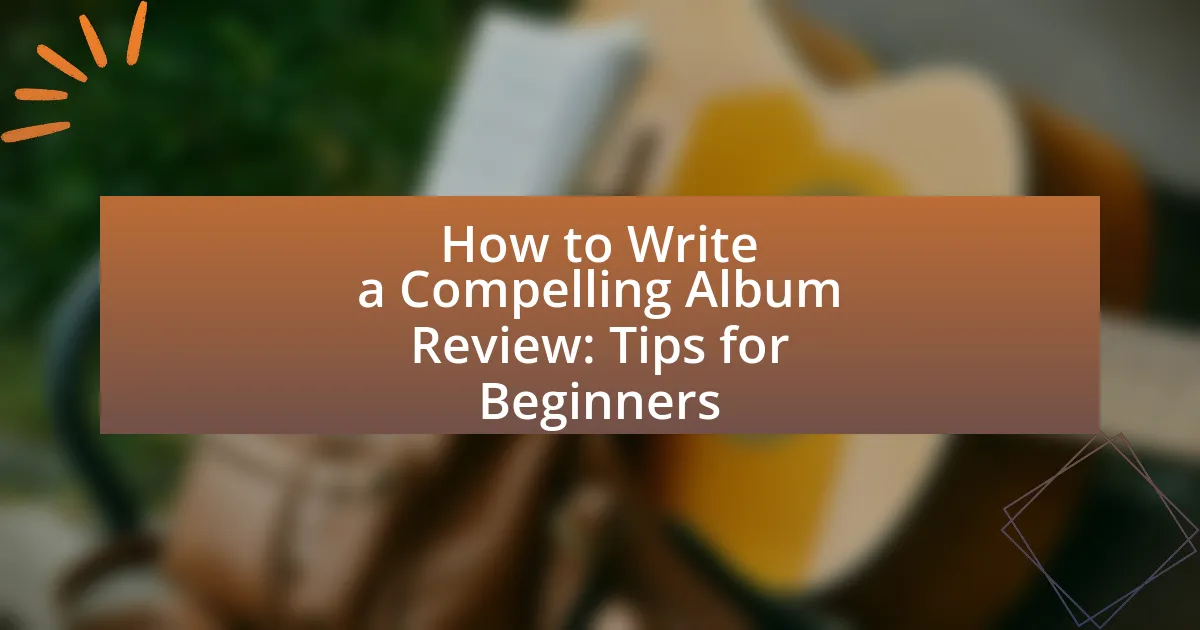A compelling album review is an insightful critique that evaluates an album’s strengths and weaknesses while engaging readers through detailed analysis of music, lyrics, and production. This article outlines the importance of writing album reviews for music enthusiasts, emphasizing how they enhance understanding and influence listener choices. Key components of an effective review include a structured approach, personal insights, and contextual analysis, which together foster a deeper appreciation for the music. Additionally, practical tips for beginners are provided, focusing on techniques for developing a unique voice and avoiding common pitfalls in album review writing.

What is a Compelling Album Review?
A compelling album review is an insightful critique that effectively communicates the strengths and weaknesses of an album while engaging the reader. It combines detailed analysis of the music, lyrics, and production with the reviewer’s personal interpretation and emotional response. For instance, a compelling review might highlight how an artist’s use of innovative soundscapes enhances the thematic depth of the album, providing specific examples from the tracks to support these claims. This approach not only informs potential listeners but also fosters a deeper appreciation for the work, making the review both informative and enjoyable to read.
Why is writing an album review important for music enthusiasts?
Writing an album review is important for music enthusiasts because it allows them to articulate their thoughts and feelings about the music, fostering a deeper understanding of the art form. By analyzing elements such as lyrics, instrumentation, and production quality, enthusiasts can enhance their listening experience and share insights with others. Furthermore, album reviews contribute to the broader music community by providing diverse perspectives, which can influence listeners’ choices and promote discussions about musical trends and innovations. This engagement not only enriches the individual’s appreciation of music but also supports artists by generating interest and dialogue around their work.
How does an album review influence listeners’ choices?
An album review significantly influences listeners’ choices by shaping their perceptions and expectations of the music. Reviews provide critical insights into the album’s themes, sound quality, and artistic direction, which can either attract or deter potential listeners. For instance, a positive review highlighting innovative production techniques or compelling lyrics can lead to increased interest and sales, as evidenced by a study from the University of Southern California, which found that favorable reviews can boost album sales by up to 30%. Conversely, negative reviews may discourage listeners from exploring an album, demonstrating the powerful role that critical analysis plays in consumer behavior within the music industry.
What role does an album review play in the music industry?
An album review serves as a critical assessment of a music release, influencing public perception and sales. Reviews provide insights into the album’s artistic quality, thematic content, and production value, guiding listeners in their purchasing decisions. For instance, a favorable review from a reputable source can significantly boost an album’s visibility and commercial success, as evidenced by studies showing that albums receiving high ratings often experience increased sales and streaming numbers. Additionally, album reviews contribute to the broader discourse within the music industry, shaping trends and artist reputations.
What elements make an album review compelling?
A compelling album review includes a clear analysis of the music, insightful commentary on the themes, and a personal perspective from the reviewer. The analysis should detail the musical elements such as instrumentation, production quality, and vocal performance, which helps readers understand the album’s sound and style. Insightful commentary on themes provides context, allowing readers to grasp the emotional and lyrical depth of the work. Additionally, a personal perspective adds authenticity, as it reflects the reviewer’s unique experience and connection to the music. These elements combined create a well-rounded and engaging review that resonates with readers.
How do personal insights enhance an album review?
Personal insights enhance an album review by providing a unique perspective that connects the reviewer’s experiences and emotions to the music. This connection allows readers to relate to the review on a personal level, making the analysis more engaging and impactful. For instance, when a reviewer shares how a particular song resonates with their life experiences, it adds depth and authenticity to the critique, encouraging readers to explore the album further. Studies in music psychology indicate that personal narratives can evoke stronger emotional responses, thereby enriching the overall understanding of the album’s themes and artistic intentions.
What is the significance of context in an album review?
The significance of context in an album review lies in its ability to provide a framework for understanding the music’s themes, influences, and the artist’s intentions. Contextual elements such as the historical background of the album, the artist’s previous works, and the cultural environment at the time of release enhance the listener’s comprehension and appreciation of the music. For instance, an album released during a specific social movement may reflect the sentiments of that time, making it crucial for reviewers to highlight these aspects to convey a deeper meaning. This contextual analysis not only enriches the review but also helps readers connect more profoundly with the album.

How to Structure Your Album Review?
To structure your album review effectively, begin with an introduction that includes the album title, artist, and release date, followed by a brief overview of the album’s themes or concepts. Next, provide a track-by-track analysis, highlighting standout songs and discussing their musical elements, lyrics, and emotional impact. After the analysis, include a section on the overall production quality, mentioning the producer and any notable collaborations. Finally, conclude with your personal opinion on the album’s strengths and weaknesses, supported by specific examples from your analysis. This structured approach ensures clarity and depth, making your review informative and engaging for readers.
What are the key components of an effective album review?
An effective album review consists of several key components: a clear introduction, a summary of the album’s themes, an analysis of the music and lyrics, a discussion of the artist’s performance, and a conclusion that reflects the reviewer’s overall impression. The introduction sets the context by mentioning the artist and album title, while the summary provides insight into the overarching themes present in the work. The analysis delves into specific tracks, examining musical elements such as instrumentation, production quality, and lyrical content. The discussion of the artist’s performance evaluates their vocal or instrumental delivery, and the conclusion synthesizes the reviewer’s thoughts, offering a final assessment of the album’s impact and significance. These components ensure that the review is comprehensive, informative, and engaging for readers.
How should you introduce the album in your review?
Introduce the album by stating its title, artist, and release date. This foundational information sets the context for the review. For example, you might say, “The album ‘Midnights’ by Taylor Swift was released on October 21, 2022.” Following this, briefly mention the genre and any notable themes or concepts that the album explores, such as its exploration of introspection and personal growth. This approach provides readers with essential background and prepares them for a deeper analysis of the album’s content and significance.
What details should be included in the body of the review?
The body of the review should include an analysis of the album’s themes, musical style, and production quality. This analysis allows readers to understand the artistic intent and execution of the work. Additionally, specific examples from the album, such as standout tracks or lyrical content, should be highlighted to support the analysis. For instance, discussing how a particular song exemplifies the album’s overall message or how the instrumentation contributes to the mood can provide depth. Furthermore, comparisons to the artist’s previous works or similar artists can contextualize the album within a broader musical landscape, enhancing the reader’s comprehension and appreciation.
How can you conclude your album review effectively?
To conclude your album review effectively, summarize the key points discussed and provide a final assessment of the album’s overall impact. This approach reinforces the main themes and arguments presented in the review, allowing readers to grasp the essence of your critique. For instance, if the album showcases innovative production and strong lyrical content, highlight these aspects in your conclusion to emphasize their significance. By doing so, you create a cohesive ending that encapsulates your insights, making it easier for readers to remember your evaluation.
What final thoughts should you leave your readers with?
To leave readers with impactful final thoughts, emphasize the importance of authenticity and personal connection in album reviews. Authenticity ensures that the review reflects the writer’s genuine feelings and insights, which resonates more with readers. A personal connection to the music allows the reviewer to convey emotions and experiences that enhance the review’s relatability. Research indicates that reviews that incorporate personal anecdotes and emotional responses are more engaging and persuasive, as they create a bond between the writer and the audience. Therefore, encourage readers to express their unique perspectives and experiences when writing album reviews.
How can you encourage reader engagement in your conclusion?
To encourage reader engagement in your conclusion, summarize key points and pose thought-provoking questions. Summarizing reinforces the main ideas presented in the album review, helping readers recall essential information. Posing questions invites readers to reflect on their own experiences with the album, fostering a sense of connection and prompting further discussion. Research indicates that interactive elements, such as questions, can significantly enhance reader involvement and retention of information, making the conclusion a powerful tool for engagement.

What Techniques Can Beginners Use to Write Album Reviews?
Beginners can use several techniques to write effective album reviews, including active listening, structuring their reviews, and incorporating personal insights. Active listening involves paying close attention to the music, lyrics, and production elements, which helps in forming a well-rounded opinion. Structuring the review with a clear introduction, body, and conclusion allows for organized thoughts and easier readability. Additionally, incorporating personal insights and emotional reactions can make the review more relatable and engaging for readers. These techniques are supported by the fact that structured and personal reviews tend to resonate more with audiences, as evidenced by numerous successful music critics who employ similar methods in their writing.
How can you develop your own voice in album reviews?
To develop your own voice in album reviews, consistently express your unique perspective and style through language and tone. This can be achieved by analyzing various genres and artists to identify what resonates with you, allowing your personal preferences to shape your critiques. Additionally, reading widely from established critics can provide insights into different writing styles, helping you to refine your own. Engaging with your audience through feedback can further enhance your voice, as it encourages you to adapt and evolve your writing based on reader responses.
What writing styles are most effective for album reviews?
Descriptive and analytical writing styles are most effective for album reviews. Descriptive writing engages readers by vividly portraying the music’s sound, lyrics, and emotional impact, while analytical writing provides critical insights into the album’s themes, production, and artist’s intent. For instance, using specific terminology related to music theory and genre conventions enhances the review’s credibility and depth, allowing readers to understand the nuances of the album. This combination of styles not only informs but also captivates the audience, making the review both informative and enjoyable.
How can you balance personal opinion with objective analysis?
To balance personal opinion with objective analysis, one should clearly differentiate between subjective feelings and factual observations. Personal opinions can be expressed through emotional responses to the music, while objective analysis should focus on measurable elements such as production quality, lyrical content, and musical structure. For instance, stating that a song evokes nostalgia is a personal opinion, whereas noting that the album features a complex chord progression is an objective analysis. This approach allows for a comprehensive review that respects both the artist’s intent and the listener’s experience, ensuring that the review is both relatable and informative.
What common mistakes should beginners avoid in album reviews?
Beginners should avoid being overly subjective in album reviews, as this can undermine the credibility of their analysis. Objective critiques that focus on musical elements, such as composition, instrumentation, and lyrical content, provide a more balanced perspective. Additionally, beginners often make the mistake of summarizing the album instead of analyzing it; effective reviews should delve into themes and the artist’s intent rather than merely recounting track details. Another common error is neglecting to consider the context of the album, including the artist’s previous work and the genre’s conventions, which can enrich the review. Lastly, beginners frequently overlook proofreading, leading to grammatical errors that detract from the professionalism of their writing.
How can vague language detract from your review?
Vague language can detract from your review by obscuring the clarity and impact of your critique. When reviewers use ambiguous terms, readers may struggle to understand the specific qualities of the album being discussed, leading to confusion about the reviewer’s actual opinions. For instance, phrases like “it was good” or “I liked it” lack detail and fail to convey the reasons behind those sentiments. Research indicates that clear and specific language enhances reader engagement and comprehension, as evidenced by studies showing that detailed descriptions improve the retention of information in reviews. Therefore, precise language is essential for effectively communicating insights and evaluations in an album review.
Why is it important to avoid bias in your writing?
Avoiding bias in writing is crucial because it ensures fairness and credibility in the content. When writers present information without bias, they provide a balanced perspective that allows readers to form their own opinions based on facts rather than skewed interpretations. Research indicates that biased writing can mislead audiences, resulting in a lack of trust in the author and the information presented. For example, a study published in the Journal of Communication found that biased reporting can significantly affect public perception and decision-making. Therefore, maintaining objectivity enhances the integrity of the writing and fosters a more informed readership.
What are some practical tips for writing your first album review?
To write your first album review effectively, start by listening to the album multiple times to grasp its themes, lyrics, and musical elements. This repeated exposure allows for a deeper understanding of the artist’s intent and the overall sound. Next, take notes on standout tracks, lyrical content, and instrumentation, which will help structure your review.
Incorporate specific examples from the album to support your opinions, such as mentioning particular lyrics or instrumental solos that resonate with you. Additionally, consider the context of the album, including the artist’s previous work and the genre’s conventions, to provide a well-rounded perspective.
Finally, maintain a clear and engaging writing style, using descriptive language to convey your thoughts while avoiding overly technical jargon that may alienate readers. This approach ensures that your review is accessible and informative, appealing to both casual listeners and dedicated fans.
